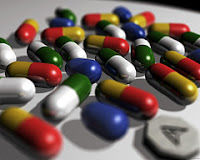Still waiting for a magic pill

A few years ago it looked like antibiotics treating MAP would be effective in attacking the cause of Crohn's disease. Early trials had been very effective in producing and maintaining remission. However, not much was heard about later, larger trials.
Giaconda, the company which now owns the rights to this therapy, have published a summary of the details so far.
The results of a Phase II clinical trial of Myoconda®, conducted at the Centre for Digestive Diseases (CDD), were published in 2002. This was followed up with a full retrospective analysis of all CDD Crohn’s patients treated for at least six months with anti-MAP therapy. This analysis of 52 patients demonstrated a remission rate of 65% with a clinical response of almost 95%. These results exceed those of any Crohn’s therapy on the market by major margins.
...
[A Phase III] trial was completed in September 2004. Overall results of the Phase IIIa trial demonstrated a statistically significant improvement in achieving remission at 16 weeks when using Myoconda® compared with conventional therapy. However, Myoconda® did not achieve statistically significant results in maintaining remission after therapy was complete in this trial.
They do not say whether the lack of remission was due to the antibiotics failing to prevent MAP, or whether the MAP was successfully eliminated but the Crohn's remained. However, since they are continuing their testing of variants of this treatment, it appears that it is the former, which means that the theory of MAP being a cause of Crohn's is still alive.
(CC-licensed image by Rodrigo Senna)